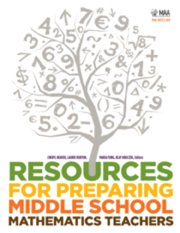Book contents
- Frontmatter
- Preface
- Contents
- I Programs for Middle School Teachers
- B In-service Training Programs
- II Courses for Middle School Teachers
- 8 Discrete Mathematics: A Course in Problem Solving for 21st Century Middle School Teachers
- 9 Guided Discovery in a Discrete Mathematics Course for Middle School Teachers
- B Geometry
- C Number Theory and Abstract Algebra
- D Precalculus and Calculus
- E Probability and Statistics
- F Combination Courses
8 - Discrete Mathematics: A Course in Problem Solving for 21st Century Middle School Teachers
from II - Courses for Middle School Teachers
- Frontmatter
- Preface
- Contents
- I Programs for Middle School Teachers
- B In-service Training Programs
- II Courses for Middle School Teachers
- 8 Discrete Mathematics: A Course in Problem Solving for 21st Century Middle School Teachers
- 9 Guided Discovery in a Discrete Mathematics Course for Middle School Teachers
- B Geometry
- C Number Theory and Abstract Algebra
- D Precalculus and Calculus
- E Probability and Statistics
- F Combination Courses
Summary
Introduction
This article describes how discrete mathematics topics have been incorporated into courses for middle school teachers at five universities using materials supported by the NSF-funded project, Discrete Mathematics for Prospective K–8 Teachers (DUE-0443317). It discusses our discrete mathematics materials and the philosophy behind their development and describes instances of implementation from each of five field-testing classrooms. Authors include the PI, co-PI, and four project participants.
Background
In the past twenty years, Rosenstein (mathematician) and DeBellis (mathematics educator) have collaborated with mathematicians, mathematics educators, and expert classroom teachers to design and develop discrete mathematics programs and materials for K–12 teachers. We have collaborated on three NSF-funded professional development projects (TPE-895-5176, TPE-915-5231, ESI-945-4406) and one NSF-funded curriculum development project (DUE0443317) and we have produced workshop materials for K–8 teachers through the professional development project (Leadership Program in Discrete Mathematics) and upper-level undergraduate course materials for prospective K– 8 teachers through the curriculum development project (Discrete Mathematics for Prospective K–8 Teachers). The Leadership Program was funded through Rutgers University and the curriculum development project through Shodor, a Teachers non-profit organization located in Durham, NC. In this article, we discuss the history of our work, general principles for teaching an activities-based discrete mathematics course in college, and offer examples of courses at five institutions.
- Type
- Chapter
- Information
- Publisher: Mathematical Association of AmericaPrint publication year: 2013

